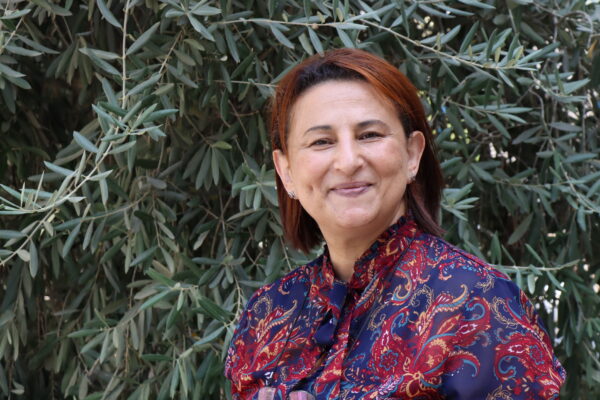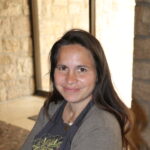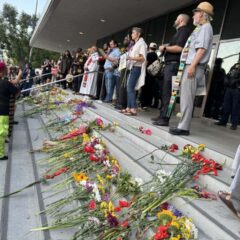Peacebuilder Huda Abu Arqoub has a spiritual vision for Israel/Palestine rooted in the past. A truly holy land, she says, is one in which all can live together.
When Huda Abu Arqoub speaks about her hopes for the future of Palestinians, she often begins by looking backwards. In particular, she likes to meditate on a very precise memory she has of her grandfather telling a story. It took place during the First Intifada, when as a teenager she and her family were trapped in their home near Hebron, in the Occupied Palestinian Territories, unable to leave because of a curfew. To help to pass the time and to calm Huda and her frightened siblings, her grandfather detailed a road trip he had once taken in his youth, traveling with a Christian and a Jewish friend. Together, the three friends had journeyed by car to Haifa, to Damascus, and to Beirut, before eventually returning to Jerusalem.
She was incredulous when she first heard his account. “What’s this? This is not the Middle East!” she remembers thinking. “This is not Palestine!”
Yet her grandfather had insisted that it was indeed Palestine, and that just decades before she was born, a time had existed in which Muslims, Christians and Jews in the region had easily been friends, and in which they could cross the now impassable borders together between countries.
“For him, that was the vision,” she tells me. “And this is what gave me strength. Later I understood that only people can make that reality. It’s not part of being a political entity that would bring that back. It’s the people who created that vision.”
The fact that her grandfather told her a story about freely traveling at the very moment in which they could not leave their own home in Hebron did not escape her. Her grandfather was giving them hope not by asking them to imagine how life could be, but by allowing them to see how life once was—and to insist that a life with those freedoms and relationships was their heritage and birthright.
“That kind of gave me an incentive to talk about access,” Abu Arqoub now says, “because at the moment, when you have no access to going anywhere, and knowing that your grandfather could—it’s like you are moving backwards rather than forwards. And I understood that it was only us [who could change things]. That became my religion.”
In interviews that spanned several months, I sat down to speak with Abu Arqoub, a long-time acquaintance of mine, as part of CRCC’s global project on engaged spirituality in order to better understand how the well-known Palestinian peace activist and educator has persevered for decades now in the face of a conflict that shows no signs of slowing down. Known for her leadership in people-to-people programs that engage members of Palestinian and Israeli civil society, today Abu Arqoub serves as the regional director of the Alliance for Middle East Peace, a network of more than 150 Palestinian and Israeli organizations engaged in peacebuilding. In 2017, she was awarded the Laudato Si Prize by the Vatican for her lifelong commitment to working in conflict transformation.
When I ask her where she finds the strength to continue her work, Abu Arqoub speaks of remaining rooted in family and faith, in that vision her grandfather gave her of people of different communities on a journey together, and in the dignity that comes in refusing to see herself and the Palestinians as victims. “This is why I feel that I’m strong—because I don’t approach the other like a weak person…no, I am someone with power,” she tells me. “I know that I belong here. And I know that this land is about having everyone together—about unity, about spirituality—about insisting that everyone has a place in that tent.”
Teaching Peace
Huda Abu Arqoub was born in 1970 in Jerusalem, the oldest of 12 children. Though she would spend most of her life outside of Jerusalem, she still roots her identity in the city of her birth, with its cosmopolitan mix of communities and faiths. She is a Palestinian who sees it as an integral part of her identity that she lives within a context of religious and cultural diversity.
Both of her parents were teachers, and she grew up in a family that emphasized the importance of education, especially for women. She knew that her grandmother had worked tirelessly to ensure that her daughters could go to school. Her mother was a communist and an outspoken feminist, and her father was a principal of the local school. They had a library at home. Her family moved to Saudi Arabia for a few brief years in her childhood, then returned to live in Bethlehem, where her father taught in a Catholic school, and finally to a village near Hebron, where she lives until today.
Born only three years after the 1967 war that led to Israel’s occupying the West Bank, the weight of the conflict hung over her childhood. One of the defining moments of her youth came as she watched her father, a school principal, struggling to keep his school open during the First Intifada, believing that education was at the root of liberation and therefore a priority, especially during conflict. At the same time, Huda was experiencing her own political awakening, increasingly aware of her identity as a Palestinian. As the oldest child, she found herself worried about her responsibility for her siblings. How would she protect her brothers and sisters should anything happen to them as a family?
Like her parents, she believed in the power of education. She decided to also become a teacher, and she would eventually work for the Palestinian Ministry of Education for 15 years. In 1997, after the Oslo Peace accords allowed for meetings between Palestinians and Israelis, she joined a team of teachers tasked with designing the first Palestinian educational curriculum. She found the experience empowering, feeling that for once Palestinians were being asked to speak for themselves.
Sent with a team of Palestinian teachers to Vienna, she met with Israeli teachers, her first experience of seeing Israelis as individuals instead of soldiers. She was surprised to discover that as teachers they were facing challenges similar to her own, and to learn that some of them were against the occupation and in favor of a Palestinian state. But just as she had judged them from her own limited experience, she also felt that many of them had stereotyped Palestinians and weren’t expecting to meet women with her level of education. She recognized that their encounter had allowed for a transformation on both sides—what she would later call the “politics of acquaintance.”
A few years later, she was invited to Boston to participate in a forum at the Irish Institute with teachers from all over the world, including Israelis. Again, she found herself surprised at her ability to connect with them. She sensed that education was a means of changing some of the obdurate dynamics of the conflict, and of allowing individuals to engage who had seen one another only as enemies.
For three summers, she interned at the Irish Institute, engrossed in their library. It was there that she first came upon the writing of Paolo Freire, the author of Pedagogy of the Oppressed. In his book, Freire writes that the oppressed, rather than themselves becoming oppressors of their oppressors in seeking their liberation, must “become restorers of the humanity in both.”
This realization–not only that she was not herself a victim, but that she also had something to offer in transforming both sides of the conflict–became a clarion call. “At that time I confirmed my belief that it is us and them who will liberate one another,” she now says. She decided to pursue studies in conflict transformation, confident that her skills in education could be channeled towards the more direct work of peacebuilding. Her colleagues at the Irish Institute encouraged her to apply for a Fulbright scholarship.
Reconnecting with Faith
Abu Arqoub was looking for a program in education that would combine educational pedagogy with the practical work of conflict resolution. She found her answer at Eastern Mennonite University, which was offering a graduate program in Conflict Transformation. Though students of all faiths attended the program, the university itself was rooted in the Anabaptist-Mennonite tradition, one deeply dedicated to community engagement, social justice, and nonviolence inspired by the example of Jesus in the gospels. In 2004, Abu Arqoub traveled to Virginia to begin her graduate studies.
Abu Arqoub had long reacted against the way she felt that religion was being politicized in the Israeli-Palestinian conflict, causing her to distance herself from her own religious life. Now, she began to return to her faith within the context of social justice, encouraged by her classmates.
Though she had always fasted during Ramadan, her Christian classmates joined her in fasting in order to encourage her as one of the only Muslim students at the university. They introduced her to a community of Iraqi Muslims who had a mosque nearby, and she joined them to pray, discovering that they, too, were seeking solace in their faith from the pain of war and conflict. “I saw their vulnerability,” she remembers, “but also their pride.”
She was deeply touched by the Mennonites’ use of circles, in which every person seated in the circle is invited to speak and is listened to equally. This act of trust opened a space within her that she had not even realized had been closed. It “reignited the spirit” inside of her.
After attending a peacemaking conference of global religious leaders—many of whom were also acting as conflict mediators for their communities—she was touched when a Muslim imam recited the Verse of Light from the Quran. “Everyone was speaking of God as light, as the light that pushes the darkness out,” she says. “And that image stayed in my brain.” She found solace in God as the Compassionate One, the Light that wants to transform the darkness. She increasingly became confident that religion didn’t have to be the cause of conflict, but could be the catalyst for healing it.
Today, though she rarely speaks of it publicly, her Muslim faith informs all that she does. “There is a light guiding us and we have to trust that light, not to fight against it,” she says.
She is resourced by performing the early morning prayers and by fasting during the holy month of Ramadan, during which she tries to read the Quran in its entirety each year. She often turns to Mary in the Quran as a source of inspiration and solace. In the Muslim tradition, Mary is called by the angel Gabriel to be the mother of Jesus, and she accepts her role despite the fact that the society speaks against her and calls her goodness into question. For Huda, Mary is fearless, a spiritual model, and a social justice advocate who is willing to stand up to the establishment when she trusts that God has put her on the right path.
Today, like her grandfather once did, Abu Arqoub looks to the past for inspiration, still finding hope in the story of Muslim, Jewish and Christian friends on a journey across borders. She finds strength in the memory of her mother’s insistence on reading and education, in which she sees the roots of her own feminism. She sees in her father, who was quietly reverent in prayer and who sometimes cried when he read the Quran, an example of piety that has informed her own faith. Just as her grandparents and parents found strength in order to remain steadfast for their children, today she is motivated by her 33 nieces and nephews to continue in her own work. Indeed, she calls peacebuilding a commitment to her loved ones, noting that without the children, all sense of hope is lost.
Peacebuilding as God’s Work
In 2014, after more than a decade working in education, Huda was named the regional director of Alliance for Middle East Peace (ALLMEP), an umbrella of organizations that includes some of the most well-known peacebuilding activities in the region: The Parents Circle, Kids4Peace, and Hand in Hand schools, among others. The work includes bereaved parents of those killed in the conflict meeting together, Israeli and Palestinian children learning in the same classrooms and speaking one another’s languages, and Muslim, Christian and Jewish Palestinian and Israeli children attending summer camps together. Abu Arqoub particularly advocates for a more visible role for women in transforming the conflict, most notably by engaging in Women Wage Peace, an organization that has at times brought thousands of Israeli and Palestinian women into the streets to argue for a solution to the conflict.
Today, with the political situation continuing to deteriorate, Huda has turned to what she calls “co-resistance,” seeking partners in those who are willing to stand against the occupation. Yet she also believes that they must co-resist the structures and positions that insist that Israelis and Palestinians must be enemies.
Her focus now is in part on the vocabulary used to talk about the conflict. Words have power. For example, she wants people to stop referring to the Palestinians as victims. “Palestinians are not victims. They are survivors,” she recently said at a speech for the Pathways to Hope conference. “They are strong, proud people, and they deserve peace.”
And as for that word “peace,” which many now consider to be a kind of bad word in the context of the conflict, used to maintain the status quo, she notes that those engaged in peace work are now often accused of taking on a “Western” vocabulary is solving conflicts, something she deeply resists. Her goal now is that they might reclaim their own narrative and be proud of the work that they do.
She turns to that image again of God as light, pushing out the darkness.
“We are ashamed of being peacebuilders,” she says. “But God is peace.”
Stephanie Saldaña is a journalist fellow with the Spiritual Exemplars Project.





